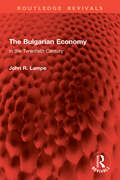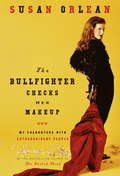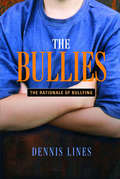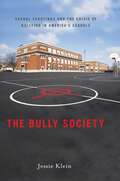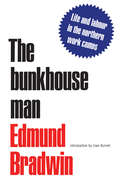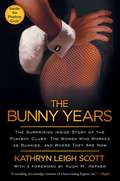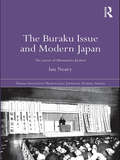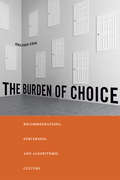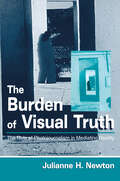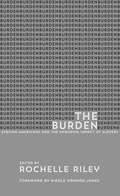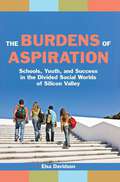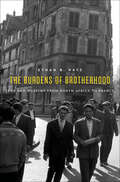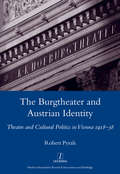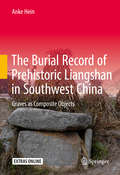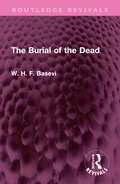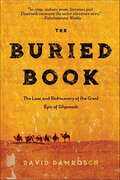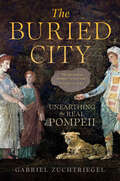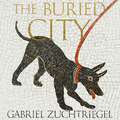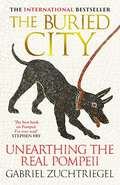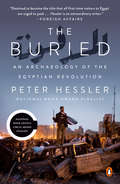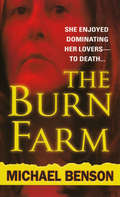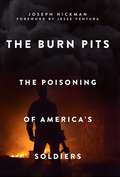- Table View
- List View
The Bulgarian Economy: In the Twentieth Century (Routledge Revivals)
by John R. LampeFirst published in 1986, The Bulgarian Economy (now with a new preface by the author) traces the rapid growth of the Bulgarian economy throughout the twentieth century. It also notes the obstacles Bulgaria has faced in bringing about industrial development in a small relatively poor country where, in the early twentieth century, agriculture predominated. It explores the difficulties which have arisen because of the unusual domination of a relatively isolated capital city, Sofia, over the rest of the country. It examines the effects of Bulgaria’s being on the losing side in three wars. An abrupt change in economic strategy and management came with the Communist accession to power in 1944 and with the simultaneous reorientation from close ties with Germany to close ties with the Soviet Union. The book shows, however, that significant state control had appeared well before this transition and that there is much in common between the pre- and post-war periods. It goes on to emphasise economic growth and structural change in the post-war period and the unusually large role of foreign trade. The reforms which have taken place since 1960 are accorded a separate, final chapter.
The Bullfighter Checks Her Makeup: My Encounters with Extraordinary People
by Susan OrleanThe bestselling author of The Orchid Thief is back with this delightfully entertaining collection of her best and brightest profiles. Acclaimed New Yorker writer Susan Orlean brings her wry sensibility, exuberant voice, and peculiar curiosities to a fascinating range of subjects--from the well known (Bill Blass) to the unknown (a typical ten-year-old boy) to the formerly known (the 1960s girl group the Shaggs). Passionate people. Famous people. Short people. And one championship show dog named Biff, who from a certain angle looks a lot like Bill Clinton. Orlean transports us into the lives of eccentric and extraordinary characters--like Cristina Sánchez, the eponymous bullfighter, the first female matador of Spain--and writes with such insight and candor that readers will feel as if they've met each and every one of them. The result is a luminous and joyful tour of the human condition as seen through the eyes of the writer heralded by the Chicago Tribune as a "journalist dynamo. "
The Bullies: Understanding Bullies and Bullying
by Dennis Lines'Dennis Lines shares his deep understanding and illustrates from long practical experience in the field of counselling, bullying and aggression.' - Educational Review Canterbury Christ Church University, UK Carl Parsons Is there a particular type of person who becomes a bully? Why do bullies behave like they do? How can we interpret and understand bullying within relationships? The Bullies attempts to get inside the minds of the bully and victim - the child, the adolescent and the adult - across a wide range of 'closed' situations including the home, school and workplace, prisons and the armed services. By listening to the voices of bullies and victims from all kinds of backgrounds without making judgements, counsellor Dennis Lines provides unique insights into bullying and what makes such domineering and aggressive behaviour so complex. He discusses controversial issues such as genetic predisposition towards abusive behaviour and draws on his counselling knowledge to provide insights on how to understand and treat bullies to change their behaviour. The Bullies offers a unique and illustrated perspective on a widespread phenomenon, and will be essential reading for psychologists, sociologists, counsellors, teachers, social workers, probation officers, students and researchers.
The Bully Society: School Shootings and the Crisis of Bullying in America’s Schools (Intersections #6)
by Jessie KleinChoice's Outstanding Academic Title list for 2013 Through interviews and case studies, Klein develops an explanation for bully behavior in America's schoolsIn today’s schools, kids bullying kids is not an occasional occurrence but rather an everyday reality where children learn early that being sensitive, respectful, and kind earns them no respect. Jessie Klein makes the provocative argument that the rise of school shootings across America, and childhood aggression more broadly, are the consequences of a society that actually promotes aggressive and competitive behavior. The Bully Society is a call to reclaim America’s schools from the vicious cycle of aggression that threatens our children and our society at large.Heartbreaking interviews illuminate how both boys and girls obtain status by acting “masculine”—displaying aggression at one another’s expense as both students and adults police one another to uphold gender stereotypes. Klein shows that the aggressive ritual of gender policing in American culture creates emotional damage that perpetuates violence through revenge, and that this cycle is the main cause of not only the many school shootings that have shocked America, but also related problems in schools, manifesting in high rates of suicide, depression, anxiety, eating disorders, self-cutting, truancy, and substance abuse. After two decades working in schools as a school social worker and professor, Klein proposes ways to transcend these destructive trends—transforming school bully societies into compassionate communities.
The Bunkhouse Man: Life and Labour in the Northern Work Camps
by Jean Burnet Edmund W. BradwinJournalists and poets, economists and political historians, have told the story of Canada's railways, but their accounts pay little attention to the workers who built them. The Bunkhouse Man is the only study devoted to these men and their lives in construction camps; a pioneering work in sociology, it is still the best description of what it was like to be a working man in Canada before the First World War. E.W. Bradwin drew on his own experience as an instructor for Frontier College, working alongside his students during the day and teaching at night, to present this graphic portrait of life in the camps from 1903 to 1914. No detached observer, Bradwin played a vigorous role trying to improve the lot of the men--practicing the sociology of engagement advocated by radical sociologists today.Work camps have existed in Canada from early pioneer times to the 1970s and are unlikely to disappear. In the years of Bradwin's study there were as many as 3,000 large camps employing 200,000 men, 5 per cent of the male labour force. Like the settling of the prairies, these camps are a characteristic Canadian phenomenon, but they have never drawn comparable attention. The republication of The Bunkhouse Man, with an introduction by Jean Burnet, makes available once more a work essential to the exploration of Canada's history and social structure.
The Bunny Years
by Kathryn Leigh ScottA PROVOCATIVE AND INSIGHTFUL PORTRAIT OF THE BEAUTIFUL, FREE-SPIRITED, AND SURPRISINGLY INDEPENDENT WOMEN OF THE ICONIC PLAYBOY CLUBS The 1960s were a time of change in America, an era when safely guarded innocence gave way to explosive social revolution. For Kathryn Leigh Scott, or Bunny Kay as she was known in the New York City Playboy Club, and the more than 250 former Bunnies she interviewed for this book, donning satin ears and a fuzzy cottontail was an act of liberation--a chance to bridge the gap between being girls and becoming women, to earn more money than their own mothers ever fathomed, and to find their way in a world that would never be the same. Lauren Hutton was a Bunny. Deborah Harry was too. Bunnies went on to become doctors, lawyers, stockbrokers, real estate tycoons, nurses, scientists, entrepreneurs, and teachers. Called "a smart oral history" by Esquire and "entertaining" by Entertainment Weekly, The Bunny Years goes beyond Gloria Steinem's infamous magazine exposé, "A Bunny's Tale," beyond detailed instructions for perfecting the "Bunny Dip" and providing Keyholders with "efficient, friendly, personalized service," to explore, in the words of the remarkable women themselves, what it really meant to be a Bunny.
The Bunny Years: The Women Who Worked as Bunnies, and Where They Are Now
by Kathryn Leigh ScottA PROVOCATIVE AND INSIGHTFUL PORTRAIT OF THE BEAUTIFUL, FREE-SPIRITED, AND SURPRISINGLY INDEPENDENT WOMEN OF THE ICONIC PLAYBOY CLUBS The 1960s were a time of change in America, an era when safely guarded innocence gave way to explosive social revolution. For Kathryn Leigh Scott, or Bunny Kay as she was known in the New York City Playboy Club, and the more than 250 former Bunnies she interviewed for this book, donning satin ears and a fuzzy cottontail was an act of liberation--a chance to bridge the gap between being girls and becoming women, to earn more money than their own mothers ever fathomed, and to find their way in a world that would never be the same. Lauren Hutton was a Bunny. Deborah Harry was too. Bunnies went on to become doctors, lawyers, stockbrokers, real estate tycoons, nurses, scientists, entrepreneurs, and teachers. Called "a smart oral history" by Esquire and "entertaining" by Entertainment Weekly, The Bunny Years goes beyond Gloria Steinem's infamous magazine exposé, "A Bunny's Tale," beyond detailed instructions for perfecting the "Bunny Dip" and providing Keyholders with "efficient, friendly, personalized service," to explore, in the words of the remarkable women themselves, what it really meant to be a Bunny.
The Buraku Issue and Modern Japan: The Career of Matsumoto Jiichiro (Nissan Institute/Routledge Japanese Studies)
by Ian NearyWritten by an internationally recognized specialist on Buraku studies, this book casts new light on majority-minority relations and the struggle for Buraku liberation. Ian Neary focuses on the Burakumin activist, left-wing politician, family company manager and arguably the most important Buraku leader of the twentieth century: Matsumoto Jiichiro. Based on primary material reflecting recent research, each chapter locates Matsumoto Jiichiro’s experience within the broader developments in Japan's social, political and economic history and illuminates dimensions of its social history during the twentieth century that are frequently left unconsidered. As an examination of Buraku history this book will appeal to scholars and students of Japanese political and economic history, ethnic and racial studies, socialism, social thought and social movements.
The Burden of Choice: Recommendations, Subversion, and Algorithmic Culture
by Jonathan CohnThe Burden of Choice examines how recommendations for products, media, news, romantic partners, and even cosmetic surgery operations are produced and experienced online. Fundamentally concerned with how the recommendation has come to serve as a form of control that frames a contemporary American as heteronormative, white, and well off, this book asserts that the industries that use these automated recommendations tend to ignore and obscure all other identities in the service of making the type of affluence they are selling appear commonplace. Focusing on the period from the mid-1990s to approximately 2010 (while this technology was still novel), Jonathan Cohn argues that automated recommendations and algorithms are far from natural, neutral, or benevolent. Instead, they shape and are shaped by changing conceptions of gender, sexuality, race, and class. With its cultural studies and humanities-driven methodologies focused on close readings, historical research, and qualitative analysis, The Burden of Choice models a promising avenue for the study of algorithms and culture.
The Burden of Visual Truth: The Role of Photojournalism in Mediating Reality (Routledge Communication Series)
by Julianne NewtonAs the visual component of contemporary media has overtaken the verbal, visual reportage has established a unique and extremely significant role in 21st-century culture. Julianne Newton has prepared this comprehensive analysis of the development of the role of visual reportage as a critical player in the evolution of our understanding of ourselves, others, and the world. The Burden of Visual Truth offers a first assessment of the role of visual journalism within the context of the complex, cross-disciplinary pool of literature and ideas required for synthesis. Newton approaches the subject matter from several perspectives, examining the theoretical and ideological bases for visual truth, particularly as conveyed by the news media, and applying relevant research on photojournalism and reality imagery to contemporary newspaper, broadcast, and internet professional practice. She extends visual communication theory by proposing an ecology of the visual for 21st century life and developing a typology of human visual behavior. Scholars in visual studies, media studies, journalism, nonverbal communication, cultural history, and psychology will find this analysis invaluable as a comprehensive base for studying reality imaging and human visual behavior. The volume also is appropriate for journalism and media studies coursework at the undergraduate and graduate levels. With its conclusions about the future of visual reportage, The Burden of Visual Truth also will be compelling reading for journalism and mass communication professionals concerned with improving media credibility and maintaining a significant course for journalism in the 21st century. For all who seek to understand the role of visual media in the formation of their views of the world and of their own identities, this volume is a must-read.
The Burden: African Americans and the Enduring Impact of Slavery
by Nikole Hannah-Jones Rochelle RileyThe Burden: African Americans and the Enduring Impact of Slavery is a plea to America to understand what life post-slavery remains like for many African Americans, who are descended from people whose unpaid labor built this land, but have had to spend the last century and a half carrying the dual burden of fighting racial injustice and rising above the lowered expectations and hateful bigotry that attempt to keep them shackled to that past. The Burden, edited by award-winning Detroit newspaper columnist Rochelle Riley, is a powerful collection of essays that create a chorus of evidence that the burden is real. As Nikole Hannah-Jones states in the book’s foreword, “despite the fact that black Americans remain at the bottom of every indicator of well-being in this country—from wealth, to poverty, to health, to infant mortality, to graduation rates, to incarceration—we want to pretend that this current reality has nothing to do with the racial caste system that was legally enforced for most of the time the United States of America has existed.” The Burden expresses the voices of other well-known Americans, such as actor/director Tim Reid who compares slavery to a cancer diagnosis, former Detroit News columnist Betty DeRamus who recounts the discrimination she encountered as a young black Detroiter in the south, and the actress Aisha Hinds who explains how slavery robbed an entire race of value and self-worth. This collection of essays is a response to the false idea that slavery wasn’t so bad and something we should all just “get over it.” The descendants of slaves have spent over 150 years seeking permission to put this burden down. As Riley writes in her opening essay, “slavery is not a relic to be buried, but a wound that has not been allowed to heal. You cannot heal what you do not treat. You cannot treat what you do not see as a problem. And America continues to look the other way, to ask African Americans to turn the other cheek, to suppress our joy, to accept that we are supposed to go only as far as we are allowed.” The Burden aims to address this problem. It is a must-read for every American.
The Burdens of Aspiration: Schools, Youth, and Success in the Divided Social Worlds of Silicon Valley
by Elsa DavidsonDuring the tech boom, Silicon Valley became one of the most concentrated zones of wealth polarization and social inequality in the United States—a place with a fast-disappearing middle class, persistent pockets of poverty, and striking gaps in educational and occupational achievement along class and racial lines. Low-wage workers and their families experienced a profound sense of exclusion from the techno-entrepreneurial culture, while middle class residents, witnessing up close the seemingly overnight success of a “new entrepreneurial” class, negotiated both new and seemingly unattainable standards of personal success and the erosion of their own economic security. The Burdens of Aspiration explores the imprint of the region’s success-driven public culture, the realities of increasing social and economic insecurity, and models of success emphasized in contemporary public schools for the region’s working and middle class youth. Focused on two disparate groups of students—low-income, “at-risk” Latino youth attending a specialized program exposing youth to high tech industry within an “under-performing” public high school, and middle-income white and Asian students attending a “high-performing” public school with informal connections to the tech elite—Elsa Davidson offers an in-depth look at the process of forming aspirations across lines of race and class. By analyzing the successes and sometimes unanticipated effects of the schools' attempts to shape the aspirations and values of their students, she provides keen insights into the role schooling plays in social reproduction, and how dynamics of race and class inform ideas about responsible citizenship that are instilled in America's youth.
The Burdens of Brotherhood: Jews and Muslims from North Africa to France
by Ethan B. KatzAn informative look at the ever-changing relationship between France’s predominant non-Christian immigrant minorities over the course of 100 years.Headlines from France suggest that Muslims have renewed an age-old struggle against Jews and that the two groups are once more inevitably at odds. But the past tells a different story. The Burdens of Brotherhood is a sweeping history of Jews and Muslims in France from World War I to the present. Here Ethan Katz introduces a richer and more complex world that offers fresh perspective for understanding the opportunities and challenges in France today.Focusing on the experiences of ordinary people, Katz shows how Jewish–Muslim relations were shaped by everyday encounters and by perceptions of deeply rooted collective similarities or differences. We meet Jews and Muslims advocating common and divergent political visions, enjoying common culinary and musical traditions, and interacting on more intimate terms as neighbors, friends, enemies, and even lovers and family members. Drawing upon dozens of archives, newspapers, and interviews, Katz tackles controversial subjects like Muslim collaboration and resistance during World War II and the Holocaust, Jewish participation in French colonialism, the international impact of the Israeli–Arab conflict, and contemporary Muslim antisemitism in France.We see how Jews and Muslims, as ethno-religious minorities, understood and related to one another through their respective relationships to the French state and society. Through their eyes, we see colonial France as a multiethnic, multireligious society more open to public displays of difference than its postcolonial successor. This book thus dramatically reconceives the meaning and history not only of Jewish–Muslim relations but ultimately of modern France itself.Praise for The Burdens of BrotherhoodWinner of the American Library in Paris Book AwardWinner of the J. Russell Major Prize for the Best Book in French HistoryWinner of the 2015 National Jewish Book Award for Writing Based on Archival MaterialWinner of the 2016 David H. Pinkney Prize for the Best Book in French History“A compelling, important, and timely history of Jewish/Muslim relations in France since 1914 that investigates the ways and venues in which Muslims and Jews interacted in metropolitan France . . . This insightful, well-researched, and elegantly written book is mandatory reading for scholars of the subject and for those approaching it for the first time.” —J. Haus, Choice
The Burgtheater and Austrian Identity: Theatre and Cultural Politics in Vienna, 1918-38
by Robert Pyrah"The collapse of the Habsburg monarchy in 1918 galvanized discussion about national identity in the new Republic of Austria. As Robert Pyrah shows in this thoroughly documented study, the complex identity politics of interwar Austria were played out in the theatres of Vienna, which enjoyed a cultural prominence rarely matched in other countries. By 1934, productions across the city were being co-opted to serve the newly patriotic cause of the Dollfuss and Schuschnigg regimes, and the Burgtheater, once known as the first German stage, had been transformed into a national theatre for Austria. Using case studies of key productions and a wealth of previously unseen archival material, Pyrah sheds new light on artistic and ideological developments throughout the period, including the neglected earlier years. He documents previously unexplored overlaps in the cultural programmes of Left and Right, and unearths evidence that key institutions were subverted by the Right well before the suspension of parliamentary rule in 1933."
The Burial Record of Prehistoric Liangshan in Southwest China
by Anke HeinThis book proposes a new model and scheme of analysis for complex burial material and applies it to the prehistoric archaeological record of the Liangshan region in Southwest China that other archaeologists have commonly given a wide berth, regarding it as too patchy, too inhomogeneous, and overall too unwieldy to work with. The model treats burials as composite objects, considering the various elements separately in their respective life histories. The application of this approach to the rich and diverse archaeological record of the Liangshan region serves as a test of this new form of analysis. This volume thus pursues two main aims: to advance the understanding of the archaeology of the immediate study area which has been little examined, and to present and test a new scheme of analysis that can be applied to other bodies of material.
The Burial Record of Prehistoric Liangshan in Southwest China: Graves as Composite Objects
by Anke HeinThis book proposes a new model and scheme of analysis for complex burial material and applies it to the prehistoric archaeological record of the Liangshan region in Southwest China that other archaeologists have commonly given a wide berth, regarding it as too patchy, too inhomogeneous, and overall too unwieldy to work with.The model treats burials as composite objects, considering the various elements separately in their respective life histories. The application of this approach to the rich and diverse archaeological record of the Liangshan region serves as a test of this new form of analysis. This volume thus pursues two main aims: to advance the understanding of the archaeology of the immediate study area which has been little examined, and to present and test a new scheme of analysis that can be applied to other bodies of material.
The Burial of the Dead (Routledge Revivals)
by W. H. BaseviFirst published in 1920, The Burial of the Dead emerged from the idea that the primitive man did not imagine graves as receptacles for the dead, but refuges for the living. The book is an anthropological and a philosophical quest to understand when and how the custom of burial came about within primitive society. The book does not limit itself to the customs and traditions of burial, but also engages with the concepts of death, life, and afterlife as conceived by the primitive man. In doing so, the author traces a continuity between the strength of beliefs in a primitive society and in a modern one, as well as the development of those beliefs into universal principles. This book will be of interest to anyone trying to unravel the mystery of death and especially to students of anthropology, history, philosophy and religion.
The Buried Book: The Loss and Rediscovery of the Great Epic of Gilgamesh
by David DamroschA “lively and accessible” history of the ancient Epic of Gilgamesh, and its sensational rediscovery in the nineteenth century (The Boston Sunday Globe).Composed in Middle Babylonia around 1200 BCE, The Epic of Gilgamesh foreshadowed later stories that would become as fundamental as any in human history: the Bible, Homer, The Thousand and One Nights. But in 600 BCE, the clay tablets that bore the story were lost—buried beneath ashes and ruins when the library of the wild king Ashurbanipal was sacked in a raid.The Buried Book begins with the rediscovery of the forgotten epic and its deciphering in 1872 by George Smith, a brilliant self-taught linguist who created a sensation—and controversy—when he discovered Gilgamesh among the thousands of tablets in the British Museum’s collection. From there the story goes backward in time, all the way to Gilgamesh himself. Damrosch reveals the story as a literary bridge between East and West: a document lost in Babylonia, discovered by an Iraqi, decoded by an Englishman, and appropriated in novels by both Philip Roth and Saddam Hussein. This is an illuminating, fast-paced tale of history as it was written, stolen, lost, and—after 2,000 years, countless battles, fevered digs, conspiracies, and revelations—finally found.“Damrosch creates vivid portraits of archaeologists, Assyriologists, and ancient kings, lending his history an almost novelistic sense of character. [He] has done a superb job of bringing what was buried to life.” —The New York Times Book Review“As astounding as the content of the Epic of Gilgamesh in which the questing hero travels to the underworld and back . . . superb and engrossing.” —Booklist (starred review)“Damrosch’s fascinating literary sleuthing will appeal to scholars and lay readers alike.” —Publishers Weekly (starred review)
The Buried City: Unearthing the Real Pompeii
by Gabriel ZuchtriegelThe director of the Pompeii Archaeological Park offers a vivid view of daily life in the lost city, shares the latest discoveries, and reflects on preserving heritage. In The Buried City, Gabriel Zuchtriegel takes us on a behind-the-scenes tour of Pompeii and reveals new archaeological finds that are being unearthed at the site’s biggest dig in a generation. As director of the Pompeii Archaeological Park, Zuchtriegel presents a uniquely intimate perspective on this city that was tragically destroyed and frozen in time by the eruption of Mount Vesuvius in 79 CE. Among the ruins, we find unmade beds, dishes left drying, and bodies of victims encased in ash, but Zuchtriegel shows that we’ve only begun to understand this fascinating place, as a third of the site remains unexcavated. Zuchtriegel leads us into the heart of the city, reconstructing Pompeii as it would have been, showing us who lived there, what mattered to them, and what happened in their final hours. The Buried City reveals the latest discoveries unearthed at Pompeii—including a banquet hall with murals of Greek gods, a fresco of what appears to be a pizza, and the remains of individuals crushed by debris—all buried for almost two thousand years. Zuchtriegel offers a vivid portrait of this World Heritage site as a vibrant and diverse city, connecting us to a past that is much closer than we think and inviting us to reflect on our role as keepers of the site and its history.
The Buried City: Unearthing the Real Pompeii
by Gabriel Zuchtriegel'The best book on Pompeii I've ever read' STEPHEN FRY'An essential read for anyone interested in this extraordinary place' TELEGRAPH'Brilliant' TOM HOLLANDA vast area of Pompeii is being excavated for the first time, revealing astonishing insights into how people really lived. In this revelatory new history, Director of Pompeii Gabriel Zuchtriegel shares the untold stories that are at last emerging.Pompeii is a world frozen in time. There are unmade beds, dishes left drying, tools abandoned by workmen, bodies embracing with love and fear. And alongside the remnants of everyday life, there are captivating works of art: lifelike portraits, exquisite frescos and mosaics, and the extraordinary sculpture of a sleeping boy, curled up under a blanket that's too small.The Buried City reconstructs the catastrophe that destroyed Pompeii on 24 August 79 CE, but it also offers a behind-the-scenes tour of the city as it was before: who lived here, what mattered to them, and what happened in their final hours. It offers us a vivid sense of Pompeii's continuing relevance, and proves that ancient history is much closer to us than we think.'A fascinating new book about what we are still learning about this most haunting of all lost cities... deeply moving' MAIL ON SUNDAY'Makes the familiar magical' DAN SNOW
The Buried City: Unearthing the Real Pompeii
by Gabriel Zuchtriegel'The best book on Pompeii I've ever read' STEPHEN FRY'An essential read for anyone interested in this extraordinary place' TELEGRAPH'Brilliant' TOM HOLLANDA vast area of Pompeii is being excavated for the first time, revealing astonishing insights into how people really lived. In this revelatory new history, Director of Pompeii Gabriel Zuchtriegel shares the untold stories that are at last emerging.Pompeii is a world frozen in time. There are unmade beds, dishes left drying, tools abandoned by workmen, bodies embracing with love and fear. And alongside the remnants of everyday life, there are captivating works of art: lifelike portraits, exquisite frescos and mosaics, and the extraordinary sculpture of a sleeping boy, curled up under a blanket that's too small.The Buried City reconstructs the catastrophe that destroyed Pompeii on 24 August 79 CE, but it also offers a behind-the-scenes tour of the city as it was before: who lived here, what mattered to them, and what happened in their final hours. It offers us a vivid sense of Pompeii's continuing relevance, and proves that ancient history is much closer to us than we think.'A fascinating new book about what we are still learning about this most haunting of all lost cities... deeply moving' MAIL ON SUNDAY'Makes the familiar magical' DAN SNOW
The Buried Life of Things
by Simon GoldhillSimon Goldhill offers a fresh and exciting perspective on how the Victorians used material culture to express their sense of the past in an age of progress, especially the biblical past and the past of classical antiquity. From Pompeian skulls on a writer's desk, to religious paraphernalia in churches, new photographic images of the Holy Land and the remaking of the cityscape of Jerusalem and Britain, Goldhill explores the remarkable way in which the nineteenth century's sense of history was reinvented through things. The Buried Life of Things shows how new technologies changed how history was discovered and analysed, and how material objects could flare into significance in bitter controversies, and then fade into obscurity and disregard again. This book offers a new route into understanding the Victorians' complex and often bizarre attempts to use their past to express their own modernity.
The Buried: An Archaeology of the Egyptian Revolution
by Peter HesslerFrom the acclaimed author of River Town and Oracle Bones, an intimate excavation of life in one of the world's oldest civilizations at a time of convulsive changeDrawn by a fascination with Egypt's rich history and culture, Peter Hessler moved with his wife and twin daughters to Cairo in 2011. He wanted to learn Arabic, explore Cairo's neighborhoods, and visit the legendary archaeological digs of Upper Egypt. After his years of covering China for The New Yorker, friends warned him Egypt would be a much quieter place. But not long before he arrived, the Egyptian Arab Spring had begun, and now the country was in chaos.In the midst of the revolution, Hessler often traveled to digs at Amarna and Abydos, where locals live beside the tombs of kings and courtiers, a landscape that they call simply al-Madfuna: "the Buried." He and his wife set out to master Arabic, striking up a friendship with their instructor, a cynical political sophisticate. They also befriended Peter's translator, a gay man struggling to find happiness in Egypt's homophobic culture. A different kind of friendship was formed with the neighborhood garbage collector, an illiterate but highly perceptive man named Sayyid, whose access to the trash of Cairo would be its own kind of archaeological excavation. Hessler also met a family of Chinese small-business owners in the lingerie trade; their view of the country proved a bracing counterpoint to the West's conventional wisdom. Through the lives of these and other ordinary people in a time of tragedy and heartache, and through connections between contemporary Egypt and its ancient past, Hessler creates an astonishing portrait of a country and its people. What emerges is a book of uncompromising intelligence and humanity--the story of a land in which a weak state has collapsed but its underlying society remains in many ways painfully the same. A worthy successor to works like Rebecca West's Black Lamb and Grey Falcon and Bruce Chatwin's The Songlines, The Buried bids fair to be recognized as one of the great books of our time.
The Burn Farm
by Michael BensonBenson takes readers behind the scenes of the sadistic and horrific true story of Shelia LaBarre, a depraved woman who tkaes in troubled men as lovers, then savagely slaughters them and burns their bodies on her New Hampshire farm. photos. Original.
The Burn Pits: The Poisoning of America's Soldiers
by Joseph Hickman“There’s a whole chapter on my son Beau… He was co-located [twice] near these burn pits.”–Joe Biden, former Vice President of the United States of AmericaThe Agent Orange of the 21st Century… Thousands of American soldiers are returning from the battlefields of Iraq and Afghanistan with severe wounds from chemical war. They are not the victims of ruthless enemy warfare, but of their own military commanders. These soldiers, afflicted with rare cancers and respiratory diseases, were sickened from the smoke and ash swirling out of the “burn pits” where military contractors incinerated mountains of trash, including old stockpiles of mustard and sarin gas, medical waste, and other toxic material.This shocking work, now for the first time in paperback, includes: Illustration of the devastation in one soldier’s intimate story A plea for help Connection between the burn pits and Major Biden’s unfortunate suffering and death The burn pits’ effects on native citizens of Iraq: mothers, fathers, and children Denial from the Department of Defense and others Warning signs that were ignored and much moreBased on thousands of government documents, over five hundred in-depth medical case studies, and interviews with more than one thousand veterans and active-duty GIs, The Burn Pits will shock the nation. The book is more than an explosive work of investigative journalism—it is the deeply moving chronicle of the many young men and women who signed up to serve their country in the wake of 9/11, only to return home permanently damaged, the victims of their own armed forces’ criminal negligence.
